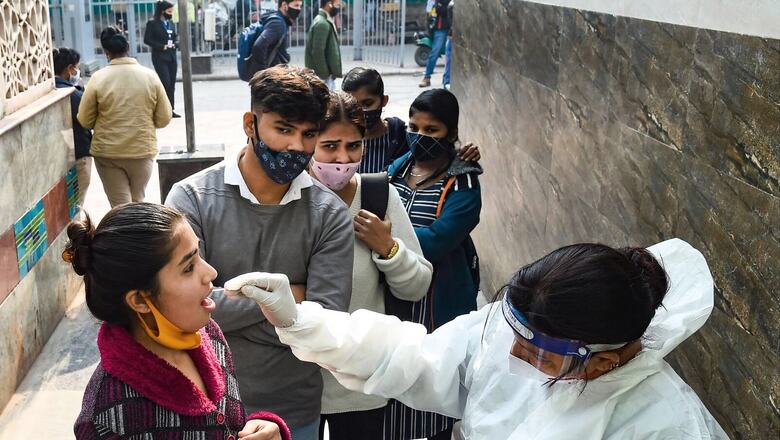
views
With India witnessing an exponential rise in COVID-19 cases since the last week, triggered in part by the new variant Omicron, following COVID-appropriate behaviour and taking the vaccine are the best ways to keep ourselves and our loved ones safe. While taking precautions is important, panicking will not help.
How Should You Prepare Differently For This Wave?
It is important to know that the preparations and precautionary measures to be taken are similar for any form of COVID; Omicron, Delta or any other variant. The measures to be taken are to prevent the spread of the virus by COVID-appropriate behaviour like masking, distancing, hand washing and avoiding large crowds especially indoor crowds in poorly ventilated areas. Aggressive vaccination protocols will certainly mitigate the seriousness of the disease, reduce ICU admissions and mortality even if it does not always prevent getting infected by the virus. Public health measures of testing (including genomic analysis when needed), tracking, isolation and other containment measures are also need of the hour.
Awareness programmes to increase public participation in preventing the spread of this virus are also needed. Although in general Omicron is less virulent than the Delta variant, it spreads more rapidly. Hence if a large number of people get infected in a short period of time, with even a small percentage requiring institutionalised care, it may put some stress on the healthcare infrastructure. Therefore, we should be prepared for such a scenario and also make all-out efforts to keep patients out of hospitals, preferably at home with monitoring, and reserve the hospital beds for the the really sick ones. In view of the fact that children have not been vaccinated so far, we need to make sure we have adequate infrastructure and personnel dedicated to paediatric care, including paediatric helplines, general beds and intensive care beds.
What are the Medicines You Should Have Handy (If Any)?
I would strongly urge everyone not to self-medicate but consult a healthcare worker for the appropriate treatment if there are any symptoms or signs of the disease. Most patients with Omicron get better on their own and do not need any specific therapy. In general, warm salt water or Betadine gargling for sore throat, paracetamol for pain and fever could be useful at home. Having a mask to protect yourself and others around you, thermometer and pulse oximeter at home are useful devices to have.
There are a few drugs when administered early could modify the disease like Paxlovid, Remdesivir and monoclonal antibody cocktail. Steroids may be needed in specific situations. But, the decision on the need for these drugs and their administration should be strictly under medical supervision. I would strongly urge everyone to get in touch with healthcare workers in case they feel they might have the disease, both for diagnosis and further management. It is also important that if you have a respiratory infection you mask up and isolate yourself and stay away from work or avoid going to crowded places to prevent spread of the disease to others till you consult a healthcare worker.
What are the Symptoms/Signs to Watch out For?
Since there is a significant overlap in the symptoms and signs of various respiratory viral diseases like common cold, flu and COVID-19, it is sometimes difficult to make a diagnosis of COVID based on symptoms alone. The common symptoms for Omicron maybe a scratchy sore throat, body ache, headache, fever and fatigue. For other variants like Delta, there may be significant shortness of breath and loss of smell and taste in addition to many other medical complications that may be associated with COVID in some cases. Hence if you have any of these symptoms, please consult your doctor who can decide on testing and further appropriate management.
In Case of a Reinfection, What Should You Do?
Neither vaccination nor a previous infection with COVID-19 will guarantee an absolute immunity against a reinfection. Hence it is important that you keep this in mind and consult your doctor if you have any of the symptoms listed above, even if you have had COVID in the past or have been vaccinated, so that appropriate management can be instituted.
When Should You Seek Admission to a Hospital?
Certainly the serious symptoms that warrant an admission to the hospital would be high fever, extreme fatigue, lethargy, shortness of breath, low oxygen levels on pulse oximeter (oxygen saturation consistently below 94 per cent) if it is being monitored, severe nausea, vomiting or diarrhoea which may cause dehydration. In general, it is prudent to consult your doctor if you’re not feeling well and seek their advice about the need for admission.
Should You Continue to Monitor O2 Level?
Omicron does not involve the lungs as much as the Delta variant hence hypoxia and shortness of breath are unusual with Omicron infection. However since one does not know for sure what kind of variant you have been infected with just by the symptoms you have, it is prudent to monitor the oxygen level using a pulse oximeter even during the current wave which is predominantly Omicron-driven.
All in all, I strongly urge citizens to be prepared but not scared of the third wave and take all the necessary precautions not to get infected or spread the disease, and seek medical help at the earliest. Please stay away from work if you have any respiratory illness and do not self-medicate. Let us all work together once again to fight the third wave and win against COVID-19.
Dr Sudarshan Ballal is Chairman, Manipal Hospitals. The views expressed in this article are those of the author and do not represent the stand of this publication.
Read all the Latest Opinions here




















Comments
0 comment